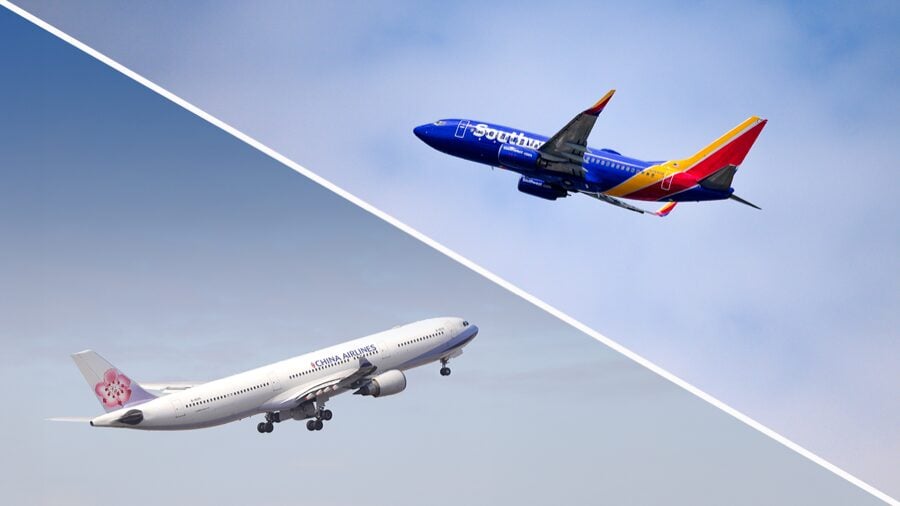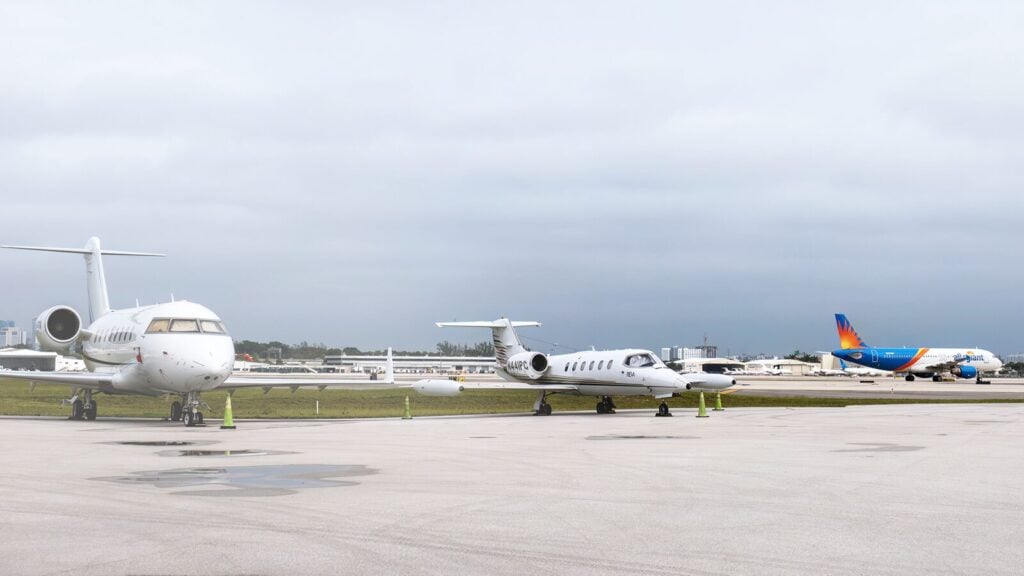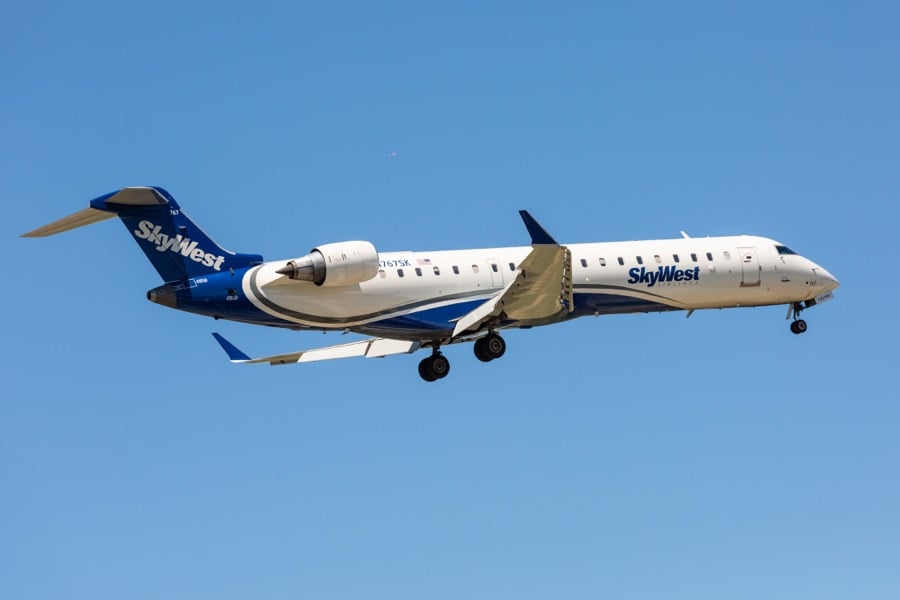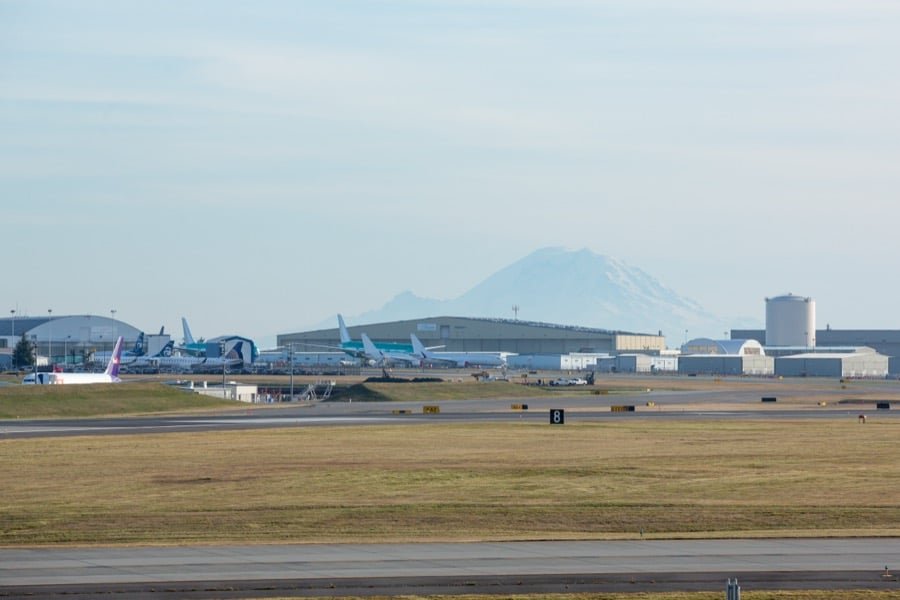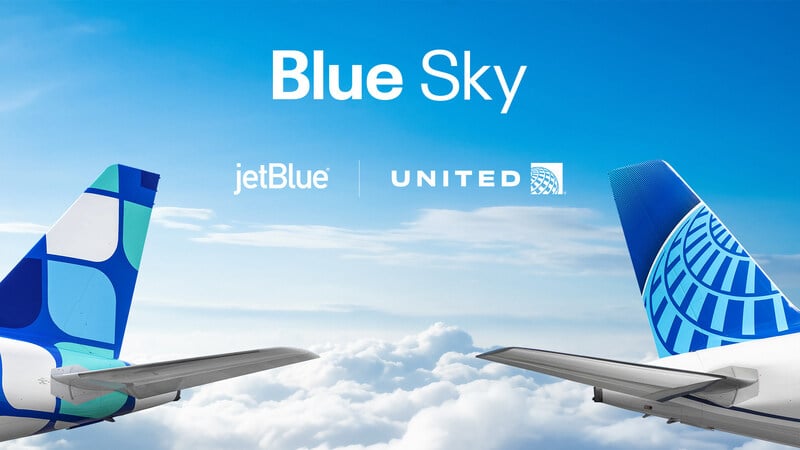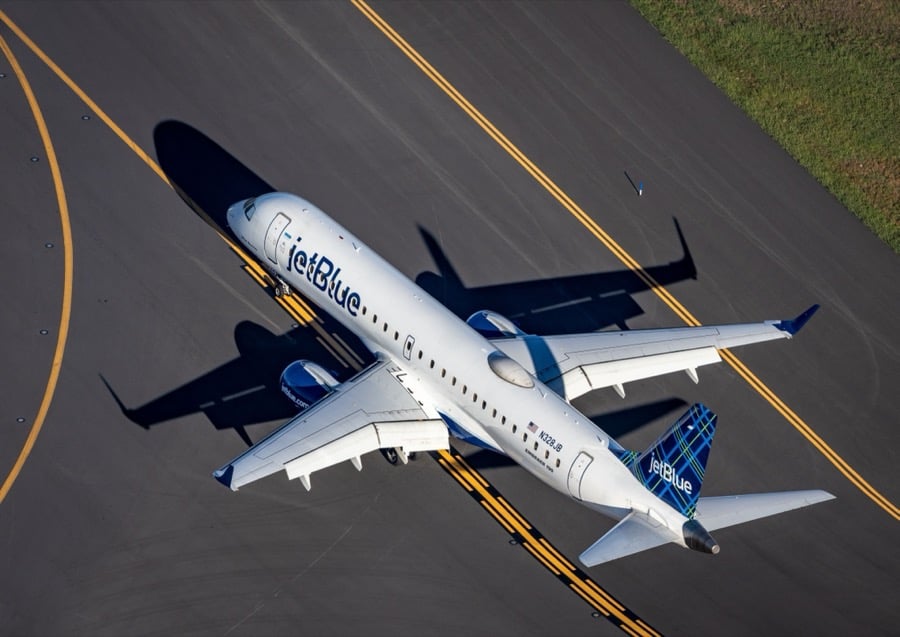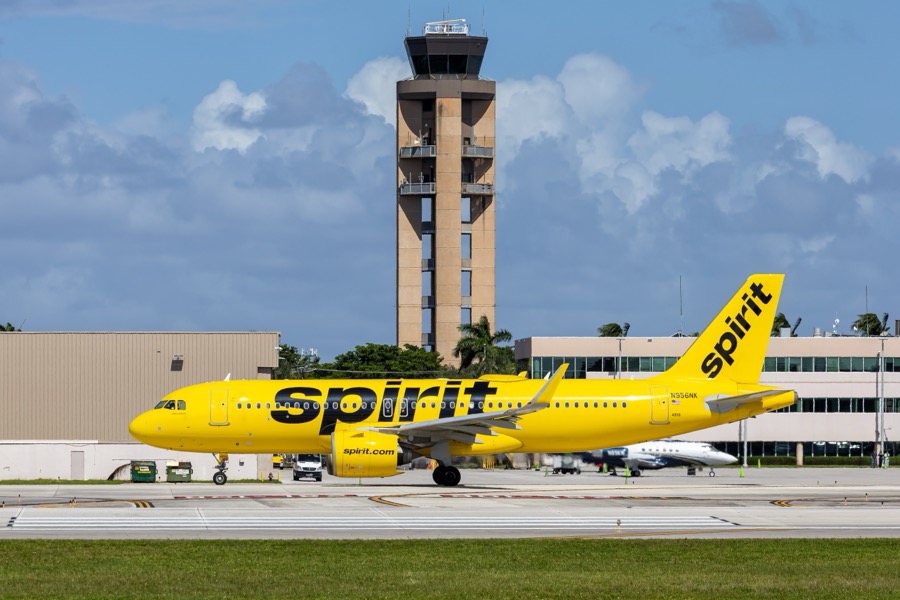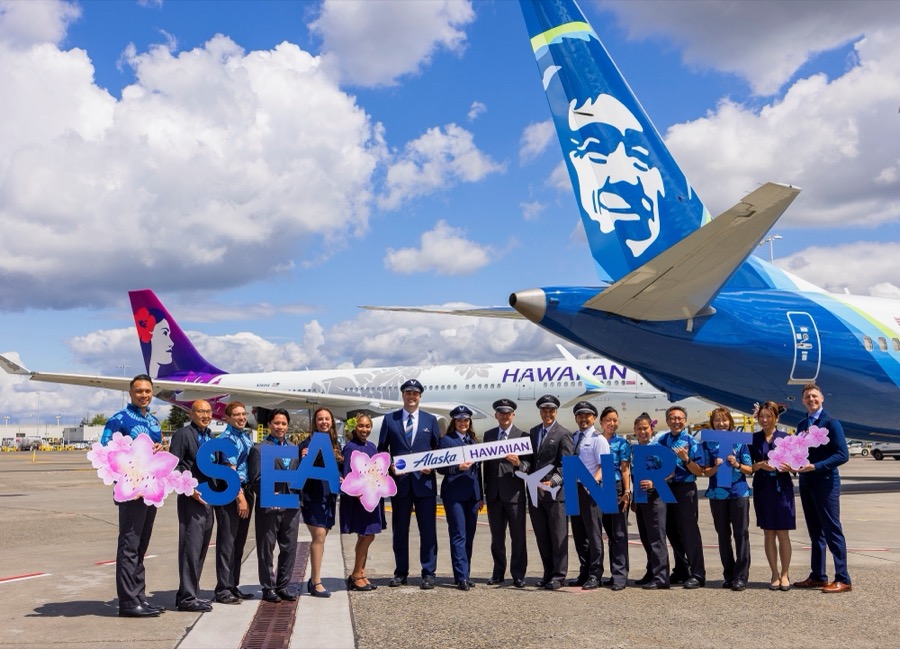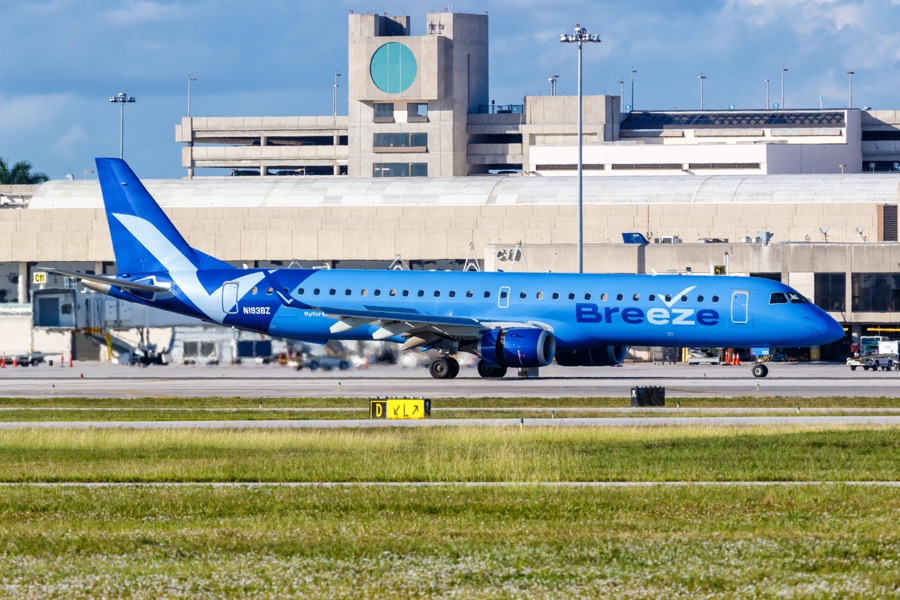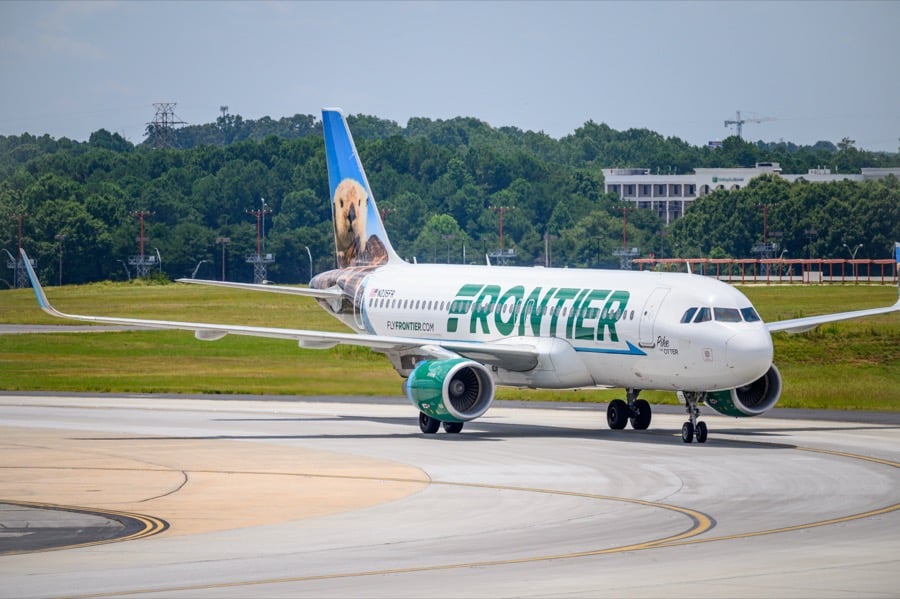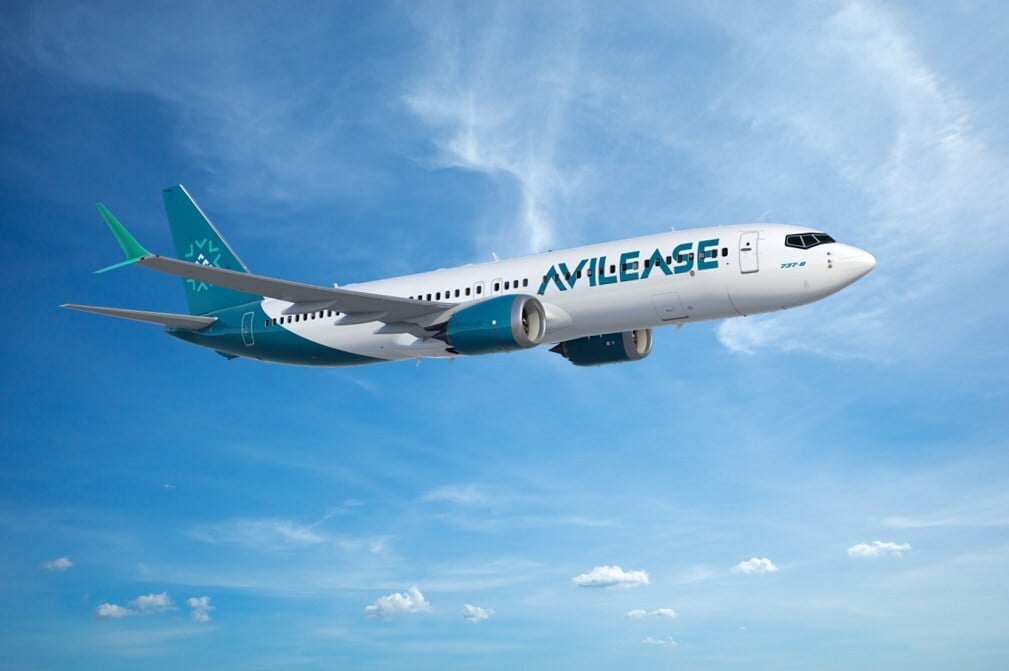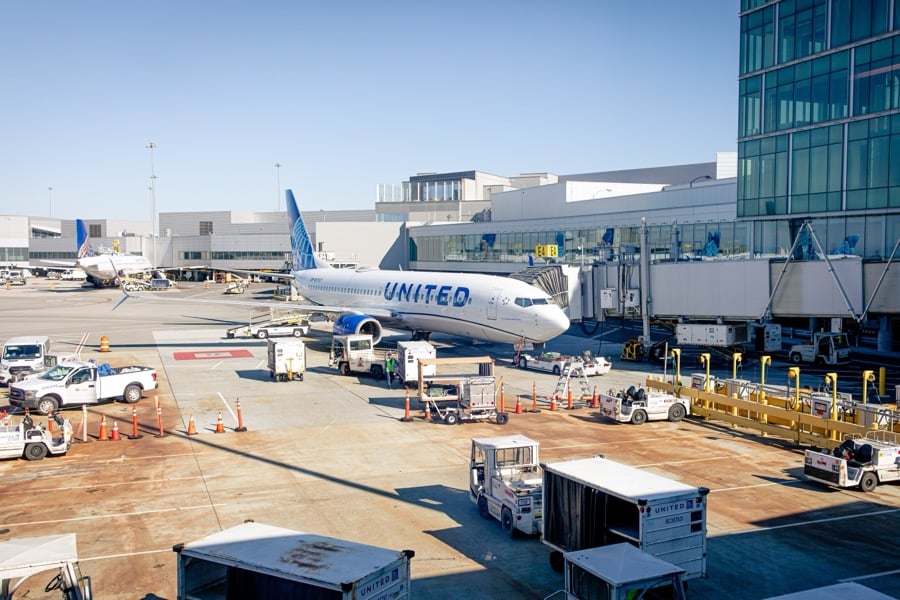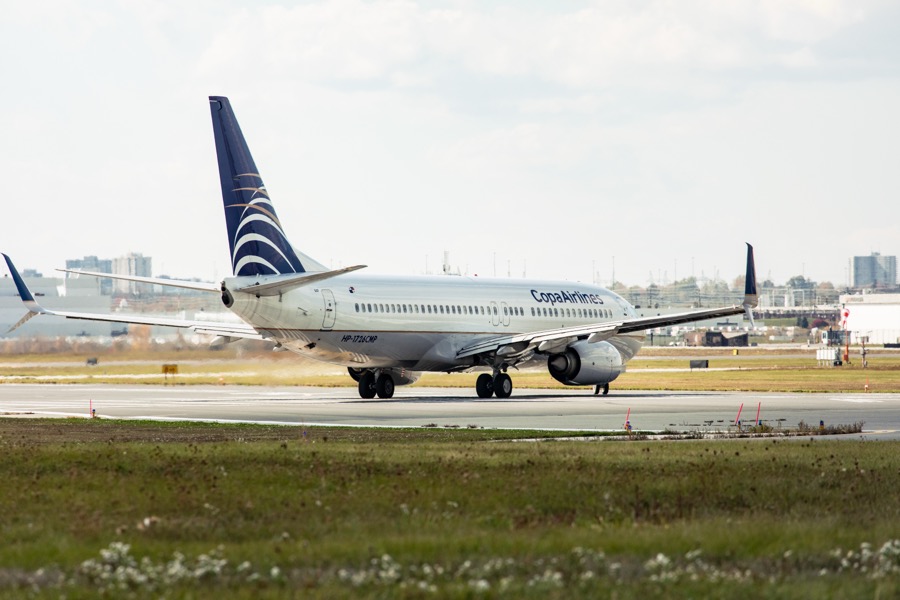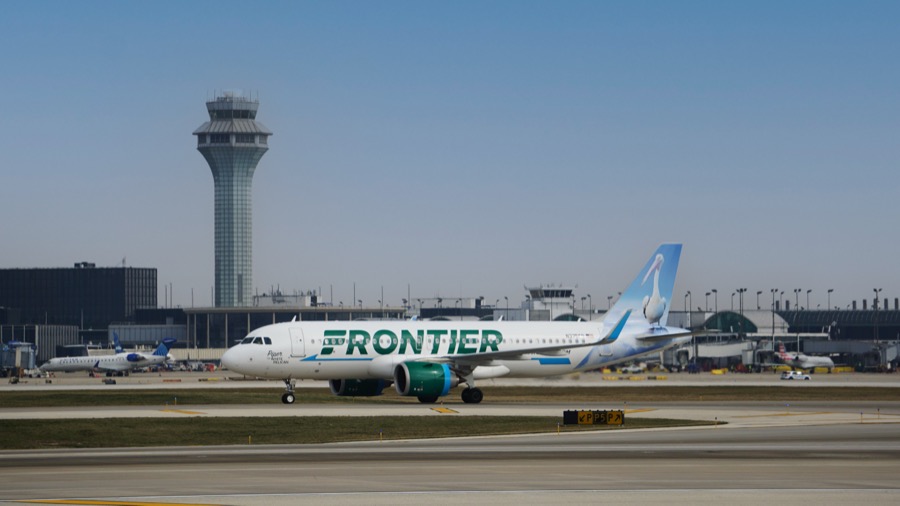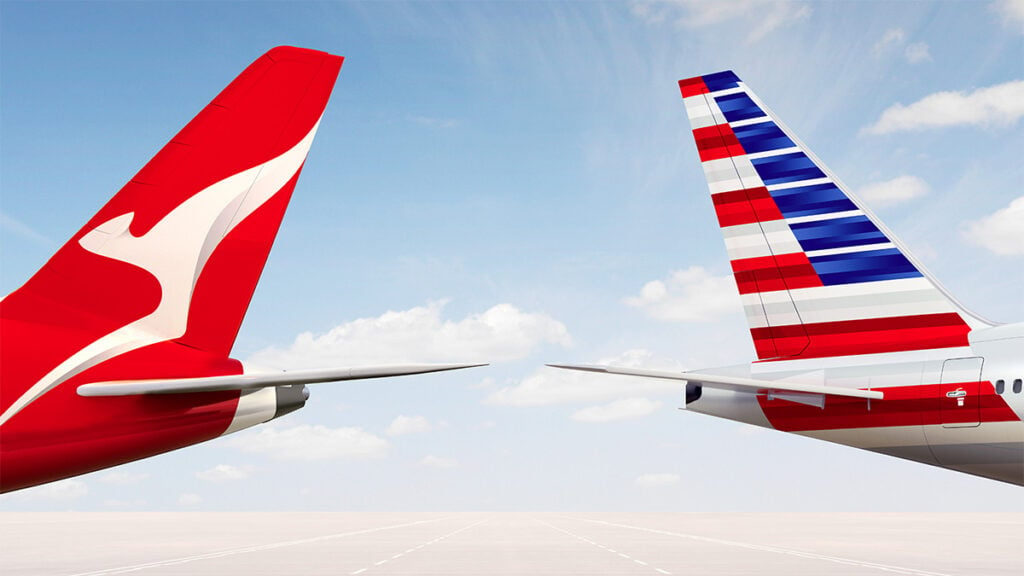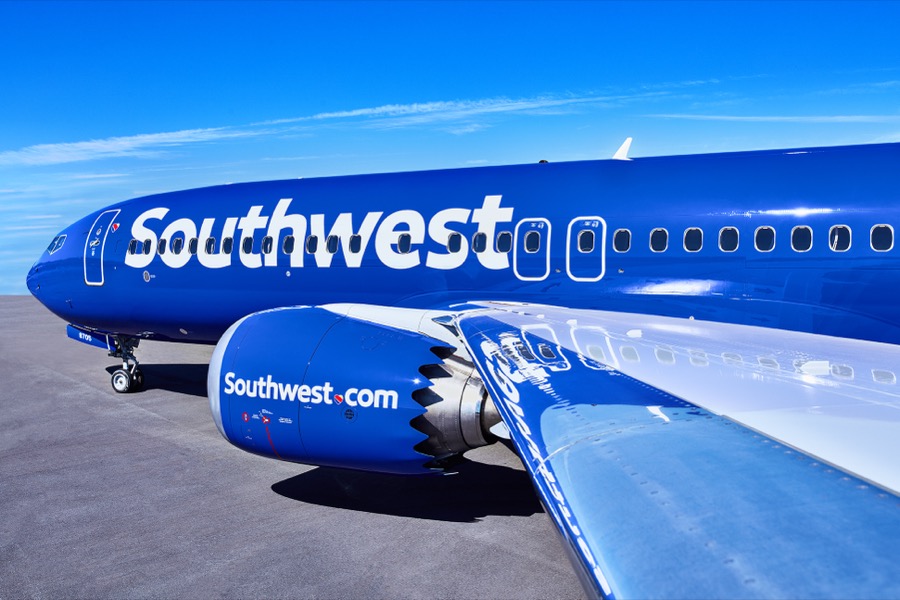
Bob Jordan, President, Chief Executive Officer, & Vice Chairman of the Board of Directors, stated, “It’s an exciting time for us as we execute on our ‘Southwest. Even Better.’ plan outlined last month at Investor Day. The transformational plan represents a culmination of the dedication and hard work of our Team. We are laser-focused on delivering the robust set of tactical and strategic initiatives included in our plan and returning to the strong financial performance we expect. We are fully committed to executing our plan and to reporting regularly on our progress. Our third quarter profit and strong operational results are reflective of the actions we are taking to deliver our plan and achieve our North Star goal of ROIC3 of at least 15 percent or greater, well above our cost of capital, in 2027. Based on our current progress, outlook, and confidence in our ability to execute our plan, we intend to repurchase an initial $250 million of Southwest common stock through an accelerated share repurchase program, which is under the $2.5 billion share repurchase authorization announced last month.”
Guidance and Outlook:
The following table provides selected financial guidance for fourth quarter 2024:
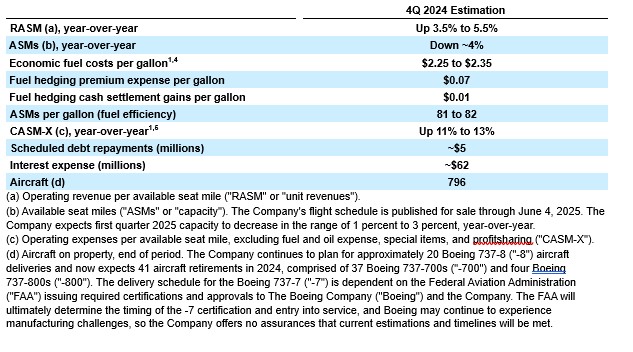
Revenue Results and Outlook:
- Third quarter 2024 operating revenues were a third quarter record of $6.9 billion, a 5.3 percent increase, year-over-year
- Third quarter 2024 passenger revenues were a third quarter record of $6.3 billion, a 5.7 percent increase, year-over-year
- Third quarter 2024 RASM increased 2.8 percent, year-over-year—within the Company's previous guidance range
The Company's record third quarter performance for both operating and passenger revenues was driven primarily by yield improvements from capacity moderation across the industry and progress in managing tactical initiatives to drive results. The Company's third quarter 2024 RASM increased 2.8 percent, year-over-year, a solid sequential improvement, and at the better end of its recently improved guidance range of 2 percent to 3 percent, year-over-year.
The Company expects fourth quarter 2024 unit revenues to increase in the range of 3.5 percent to 5.5 percent on a year-over-year basis with capacity down approximately 4 percent, also on a year-over-year basis. This guidance range contemplates a headwind of just under one-half point from Hurricane Milton and the resulting Customer cancellations. Thus far in the quarter, travel demand remains healthy and bookings-to-date for the holiday season are strong, demonstrating the continued resilience of the leisure travel market. The guidance range represents another sequential year-over-year unit revenue improvement driven by the Company's focus on tactical actions including network optimization and capacity moderation, marketing and distribution evolution, and continued efforts to advance revenue management techniques.
Fuel Costs and Outlook:
- Third quarter 2024 economic fuel costs were $2.55 per gallon1—within the Company's previous guidance range—and included $0.07 per gallon in premium expense and $0.02 per gallon in favorable cash settlements from fuel derivative contracts
- Third quarter 2024 fuel efficiency improved 1.5 percent, year-over-year, primarily due to more -8 aircraft, the Company's most fuel-efficient aircraft, as a percentage of its fleet
- As of October 16, 2024, the fair market value of the Company's fuel derivative contracts settling in fourth quarter 2024 through the end of 2027 was an asset of $144 million
The Company's multi-year fuel hedging program continues to provide protection against spikes in energy prices. The Company's current fuel derivative contracts contain a combination of instruments based on West Texas Intermediate and Brent crude oil, and refined products, such as heating oil. The economic fuel price per gallon sensitivities4 provided in the table below assume the relationship between Brent crude oil and refined products based on market prices as of October 16, 2024.
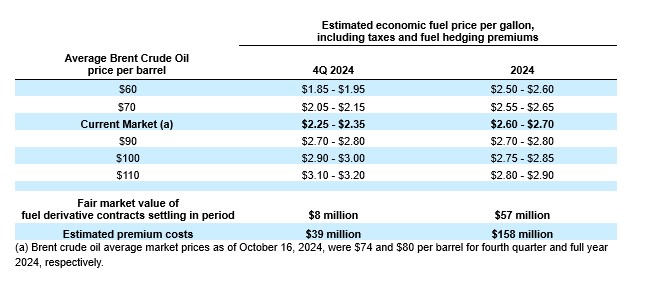
In addition, the Company is providing its maximum percentage of estimated fuel consumption6 covered by fuel derivative contracts in the following table:

Non-Fuel Costs and Outlook:
- Third quarter 2024 operating expenses increased 6.6 percent, year-over-year, to $6.8 billion
- Third quarter 2024 operating expenses, excluding fuel and oil expense, special items, and profitsharing1, increased 14.3 percent, year-over-year
- Third quarter 2024 CASM-X increased 11.6 percent, year-over-year—within the Company's previous guidance range
The Company's third quarter CASM-X increase came in at the better end of its previous expected range. The Company continues to take urgent steps to control costs, including offering voluntary time off programs and controlling hiring to address overstaffing. The Company also continues to expect savings from its cost plan announced last month to ramp up over the next three years to reach over $500 million in run rate cost savings in 2027.
The Company anticipates fourth quarter 2024 CASM-X to increase in the range of 11 percent to 13 percent, year-over-year, as cost pressures continue, particularly from new labor contracts. Fourth quarter CASM-X is further pressured by a 4 percent reduction in year-over-year capacity, as well as just over one-half point of unit cost headwind from flight cancellations associated with Hurricane Milton.
The Company continues to estimate its full year 2024 effective tax rate to be approximately 24 percent.
Capacity, Fleet, and Capital Spending:
- Third quarter 2024 capacity increased 2.4 percent, year-over-year—in line with the Company's previous guidance
- The Company received nine -8 aircraft and retired 15 aircraft (14 -700 aircraft and one -800 aircraft) in third quarter 2024, ending the quarter with 811 aircraft
- Third quarter 2024 capital expenditures were $517 million, driven primarily by aircraft-related capital spending, as well as technology, facilities, and operational investments
Given the Company's ongoing discussions with Boeing and expected aircraft delivery delays, the Company continues to plan for approximately 20 -8 aircraft deliveries in 2024, which differs from its contractual order book displayed in the table below. The Company has also chosen to retire
six additional aircraft in 2024, bringing total aircraft retirements for the year to approximately 41 (37 -700s and four -800s), resulting in a fleet of roughly 796 aircraft at year-end 2024.
The Company's flight schedule is published for sale through June 4, 2025. The Company estimates fourth quarter 2024 capacity to decrease approximately 4 percent and first quarter 2025 capacity to decrease in the range of 1 percent to 3 percent, both year-over-year. The Company continues to expect annual capacity growth in 2025, 2026, and 2027 to be in the 1 percent to 2 percent range, on a year-over-year basis, funded through tactical initiatives of improving aircraft turn time and launching redeye flights.
The Company now estimates its 2024 capital spending to be roughly $2.1 billion, which includes approximately $825 million in aircraft capital spending, assuming approximately 20 -8 aircraft deliveries in 2024. The reduction from prior guidance of approximately $2.5 billion is primarily due to changes in expectations of future aircraft delivery timing as Boeing delivery delays persist into 2025. The Company and Boeing continue to have ongoing discussions regarding the financial impacts to the Company as a result of aircraft delivery delays.
Since the previous financial results released on July 25, 2024, the Company exercised nine -7 options for delivery in 2025, one -7 option for delivery in 2026, and converted nine 2025 -7 firm orders into 2025 -8 firm orders. The following tables provide further information regarding the Company's contractual order book and compare its contractual order book as of October 24, 2024, with its previous order book as of July 25, 2024. The contractual order book as of October 24, 2024 does not include the impact of delivery delays and is subject to change based on ongoing discussions with Boeing and subject to their production capability.
Current 737 Contractual Order Book as of October 24, 2024:
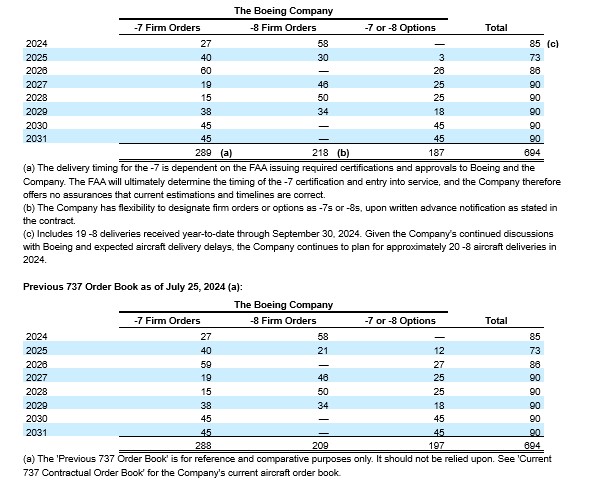
Liquidity and Capital Deployment:
- The Company ended third quarter 2024 with $9.4 billion in cash and cash equivalents and
- short-term investments, and a fully available revolving credit line of $1.0 billion
- The Company continues to have a large base of unencumbered assets with a net book value of approximately $17.1 billion, including $14.2 billion in aircraft value and $2.9 billion in non-aircraft assets such as spare engines, ground equipment, and real estate
- The Company had a net cash position7 of $1.4 billion, and adjusted debt to invested capital (“leverage”)8 of 46 percent as of September 30, 2024
- The Company has returned $431 million to its Shareholders through the payment of dividends year-to-date as of September 30, 2024
- Under the $2.5 billion share repurchase program authorized by the Company's Board of Directors in September 2024, the Company intends to launch an initial $250 million accelerated share repurchase program soon (“fourth quarter 2024 ASR program”). Subsequent to the launch of the fourth quarter 2024 ASR program, the Company will have $2.25 billion remaining under the recently authorized $2.5 billion share repurchase program
- The Company paid $11 million during third quarter 2024 to retire debt and finance lease obligations, including $5 million in principal related to lease return and lease buyout transactions and $6 million in scheduled lease payments
Awards and Recognitions:
- Ranked on The Wall Street Journal’s Best Managed Companies list
- The Southwest Rapid Rewards® Premier and Priority Credit Cards, issued by Chase, were named the top two Co-Branded Airline Credit Cards for Customer Satisfaction in the J.D. Power 2024 U.S. Credit Card Satisfaction Study9
- Named a Best Place to Work for Disability Inclusion after achieving a top score on Disability:IN's 2024 Disability Equality Index
- The Southwest Airlines Repurpose with Purpose program won the Changemakers Award in the People & Community Category at the 2024 Skift IDEA Awards
- Recognized by the Denver Business Journal as a 2024 Partner in Philanthropy recipient
- Achieved Qurator certification, the official mark of excellence for Hawai‘i-based and operating businesses, from the Hawai‘i Tourism Authority (HTA)
Environmental, Social, and Governance (“ESG”):
- SAFFiRE Renewables, a part of the Southwest Airlines Renewable Ventures investment portfolio, broke ground on its pilot plant at Conestoga Energy’s Arkalon Energy facility in Liberal, Kansas. This marks a significant step in SAFFiRE’s journey to transform corn stover into an abundant low carbon feedstock for sustainable aviation fuel
- Signed a memorandum of understanding with Archer Aviation to develop operational plans for electric air taxi networks utilizing Archer's eVTOL aircraft at California airports where Southwest operates
- Celebrated Disability Pride Month throughout July 2024, recognizing people with disabilities and their contributions to society
- Announced a partnership with the National Park Foundation, the official charitable partner of the National Park Service dedicated to protecting and enhancing America's national parks for present and future generations
- Celebrated the contributions and influence of Hispanic Americans throughout Hispanic Heritage Month
- Visit southwest.com/citizenship for details about the Company's ongoing ESG efforts
Supplemental Financial Information:
The Company will provide additional details on progress against initiative development and expected financial results, including a scorecard. This will be available on the Investor Relations website at https://www.southwestairlinesinvestorrelations.com.
Conference Call:
The Company will discuss its third quarter 2024 results on a conference call at 12:30 p.m. Eastern Time today. To listen to a live broadcast of the conference call, please go to https://www.southwestairlinesinvestorrelations.com.
Footnotes
1See Note Regarding Use of Non-GAAP Financial Measures for additional information on special items. In addition, information regarding special items and economic results is included in the accompanying table Reconciliation of Reported Amounts to Non-GAAP Measures (also referred to as “excluding special items”).
2Includes $9.4 billion in cash and cash equivalents and short-term investments, and a fully available revolving credit line of $1.0 billion.
3Return on invested capital (“ROIC”). See Note Regarding Use of Non-GAAP Financial Measures for additional information on ROIC. In addition, information regarding ROIC and economic results is included in the accompanying table Non-GAAP Return on Invested Capital (ROIC).
4Based on the Company's existing fuel derivative contracts and market prices as of October 16, 2024, fourth quarter and full year 2024 economic fuel costs per gallon are estimated to be in the range of $2.25 to $2.35 and $2.60 to $2.70, respectively. Economic fuel cost projections do not reflect the potential impact of special items because the Company cannot reliably predict or estimate the hedge accounting impact associated with the volatility of the energy markets, or the impact to its financial statements in future periods. Accordingly, the Company believes a reconciliation of non-GAAP financial measures to the equivalent GAAP financial measures for projected results is not meaningful or available without unreasonable effort. See Note Regarding Use of Non-GAAP Financial Measures.
5Projections do not reflect the potential impact of fuel and oil expense, special items, and profitsharing because the Company cannot reliably predict or estimate those items or expenses or their impact to its financial statements in future periods, especially considering the significant volatility of the fuel and oil expense line item. Accordingly, the Company believes a reconciliation of non-GAAP financial measures to the equivalent GAAP financial measures for these projected results is not meaningful or available without unreasonable effort.
6The Company's maximum fuel hedged percentage is calculated using the maximum number of gallons that are covered by derivative contracts divided by the Company's estimate of total fuel gallons to be consumed for each respective period. The Company's maximum number of gallons that are covered by derivative contracts may be at different strike prices and at strike prices materially higher than the current market prices. The volume of gallons covered by derivative contracts that are ultimately exercised in any given period may vary significantly from the volumes used to calculate the Company's maximum fuel hedged percentages, as market prices and the Company's fuel consumption fluctuate.
7Net cash position is calculated as the sum of cash and cash equivalents and short-term investments, less the sum of short-term and long-term debt.
8See Note Regarding Use of Non-GAAP Financial Measures for an explanation of the Company's leverage calculation.
9Southwest Rapid Rewards Premier Card, issued by J.P. Morgan Chase Bank, N.A., received the highest score in the Airline Co-Brand Credit Cards segment of the J.D. Power 2024 U.S. Credit Card Satisfaction Study. This study profiles the experiences of customers from the largest credit card issuers. Visit jdpower.com/awards for more details.
Cautionary Statement Regarding Forward-Looking Statements
This news release contains forward-looking statements within the meaning of Section 27A of the Securities Act of 1933, as amended, and Section 21E of the Securities Exchange Act of 1934, as amended. Specific forward-looking statements include, without limitation, statements related to (i) the Company’s planned shareholder returns; (ii) the Company’s initiatives, strategic priorities and focus areas, goals, and opportunities, including with respect to returning to strong financial performance, creating shareholder value, restoring margins, shareholder returns, improved operational efficiency, capital allocation, Customer Experience enhancements, and improved return on invested capital; (iii) the Company's financial and operational outlook, expectations, goals, plans, and projected results of operations, including with respect to its initiatives, and including factors and assumptions underlying the Company's expectations and projections; (iv) the Company’s plans and expectations with respect to its network, its capacity, its network optimization efforts, its network plan, and capacity and network adjustments, and including factors and assumptions underlying the Company's expectations and projections; (v) the Company's expectations with respect to fuel costs, hedging gains, and fuel efficiency, and the Company's related management of risks associated with changing jet fuel prices, including factors underlying the Company's expectations; (vi) the Company's plans, estimates, and assumptions related to repayment of debt obligations, interest expense, effective tax rate, and capital spending, including factors and assumptions underlying the Company's expectations and projections; (vii) the Company’s fleet plans and expectations, including with respect to fleet utilization, fleet modernization, flexibility, and expected fleet deliveries and retirements, and including factors and assumptions underlying the Company's plans and expectations; (viii) the Company’s plans and expectations with respect to marketing and distribution evolution and its continued efforts to advance revenue management techniques; (ix) the Company’s labor plans and expectations, including the Company’s hiring and headcount plans and expectations; and (x) the Company’s plans and expectations with respect to redeye flying and reducing turn times. These forward-looking statements are based on the Company's current estimates, intentions, beliefs, expectations, goals, strategies, and projections for the future and are not guarantees of future performance. Forward-looking statements involve risks, uncertainties, assumptions, and other factors that are difficult to predict and that could cause actual results to vary materially from those expressed in or indicated by them. Factors include, among others, the impact of fears or actual outbreaks of diseases, extreme or severe weather and natural disasters, actions of competitors (including, without limitation, pricing, scheduling, capacity, and network decisions, and consolidation and alliance activities), consumer perception, economic conditions, banking conditions, fears or actual acts of terrorism or war, sociodemographic trends, and other factors beyond the Company's control, on consumer behavior and the Company's results of operations and business decisions, plans, strategies, and results; (ii) the Company's ability to timely and effectively implement, transition, operate, and maintain the necessary information technology systems and infrastructure to support its operations and initiatives, including with respect to revenue management and assigned and premium seating; (iii) the cost and effects of the actions of activist shareholders; (iv) the Company’s ability to obtain and maintain adequate infrastructure and equipment to support its operations and initiatives; (v) the impact of fuel price changes, fuel price volatility, volatility of commodities used by the Company for hedging jet fuel, and any changes to the Company's fuel hedging strategies and positions, on the Company's business plans and results of operations; (vi) the Company's dependence on The Boeing Company (“Boeing”) and Boeing suppliers with respect to the Company's aircraft deliveries, Boeing MAX 7 aircraft certifications, fleet and capacity plans, operations, maintenance, strategies, and goals; (vii) the Company's dependence on the Federal Aviation Administration with respect to safety approvals for the new cabin layout and the certification of the Boeing MAX 7 aircraft; (viii) the Company's dependence on other third parties, in particular with respect to its technology plans, its plans and expectations related to revenue management, operational reliability, fuel supply, maintenance, Global Distribution Systems, environmental sustainability, and the impact on the Company's operations and results of operations of any third party delays or nonperformance; (ix) the Company’s ability to timely and effectively prioritize its initiatives and focus areas and related expenditures; (x) the impact of labor matters on the Company's business decisions, plans, strategies, and results; (xi) the impact of governmental regulations and other governmental actions on the Company's business plans, results, and operations; (xii) the Company's dependence on its workforce, including its ability to employ and retain sufficient numbers of qualified Employees with appropriate skills and expertise to effectively and efficiently maintain its operations and execute the Company’s plans, strategies, and initiatives; (xiii) the emergence of additional costs or effects associated with the cancelled flights in
December 2022, including litigation, government investigation and actions, and internal actions; and (xiv) other factors, as described in the Company's filings with the Securities and Exchange Commission, including the detailed factors discussed under the heading “Risk Factors” in the Company's Annual Report on Form 10-K for the fiscal year ended December 31, 2023, and in the Company’s Quarterly Report on Form 10-Q for the fiscal quarter ended June 30, 2024.
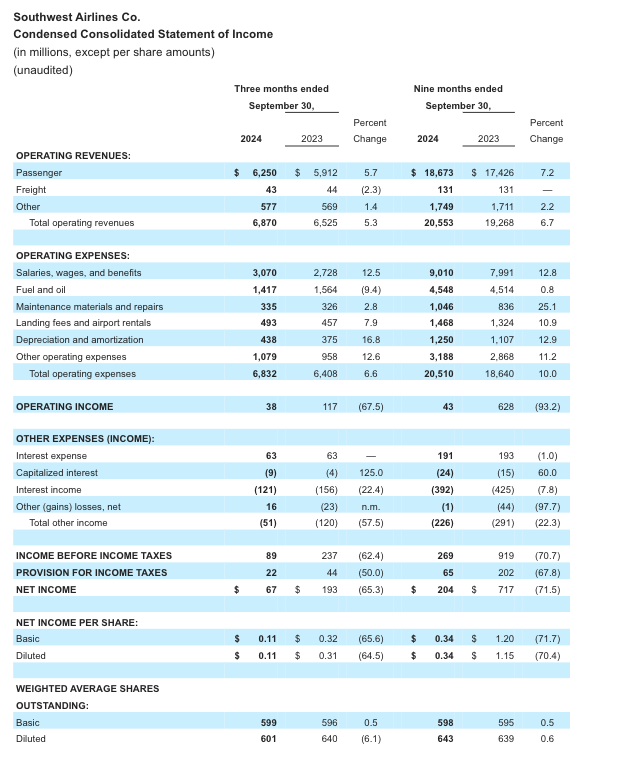
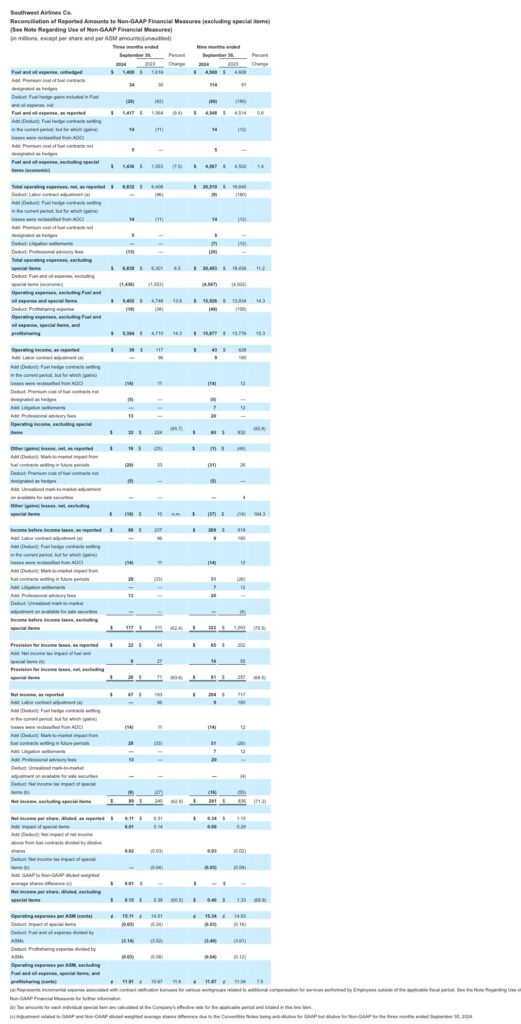
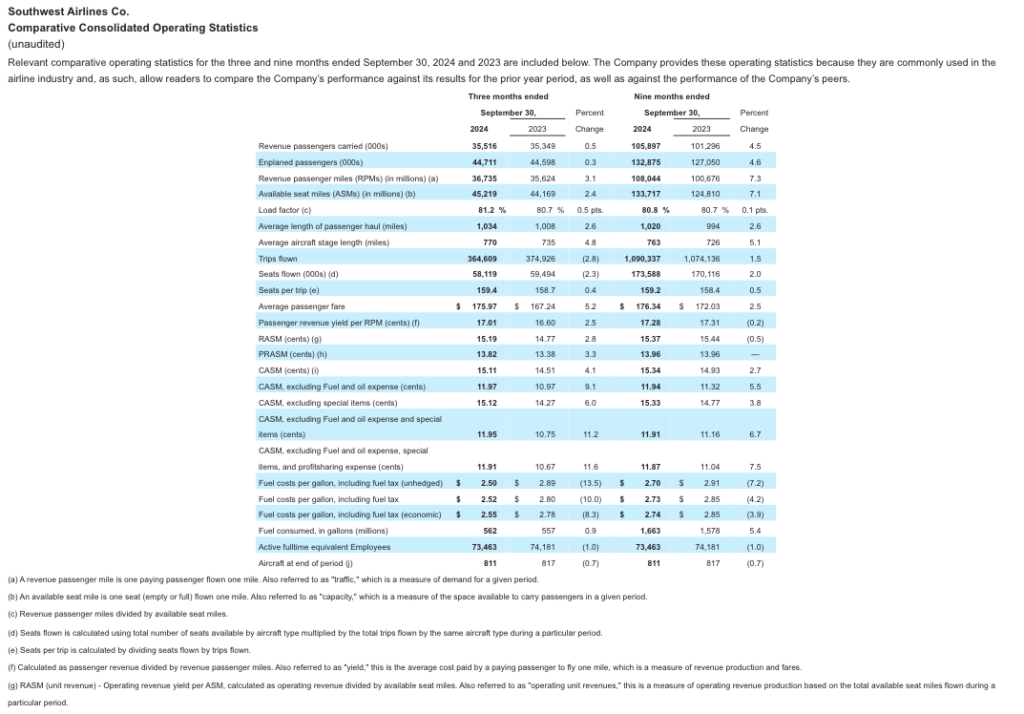
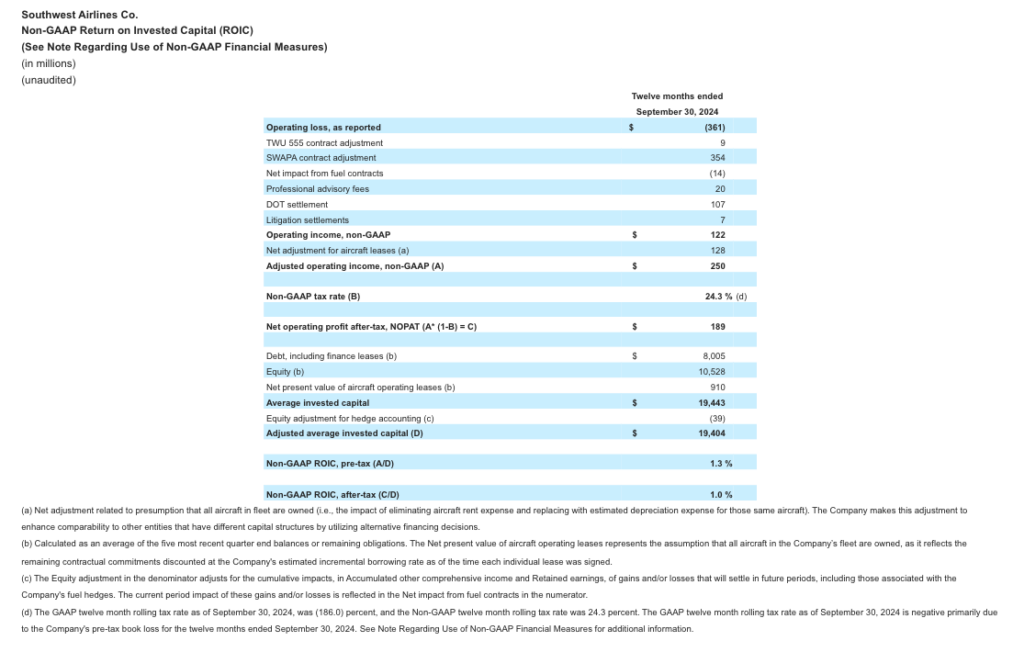
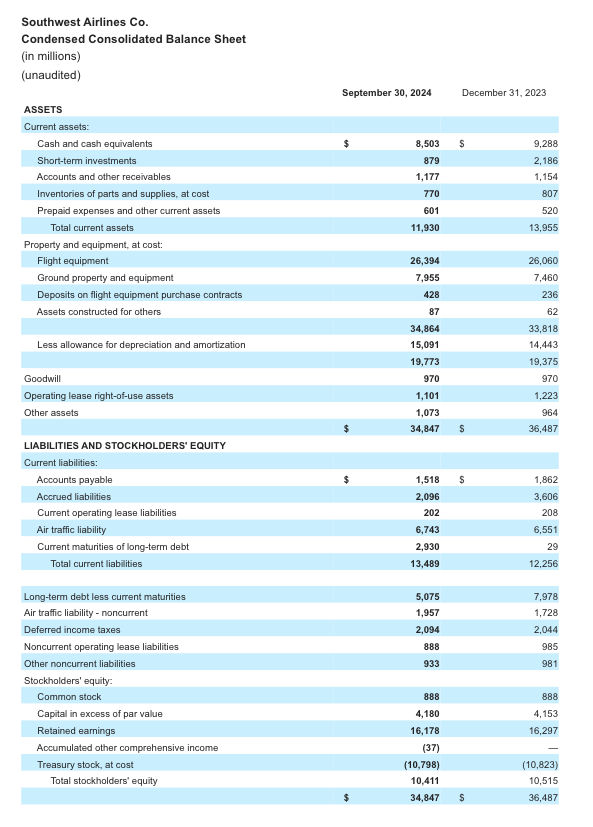
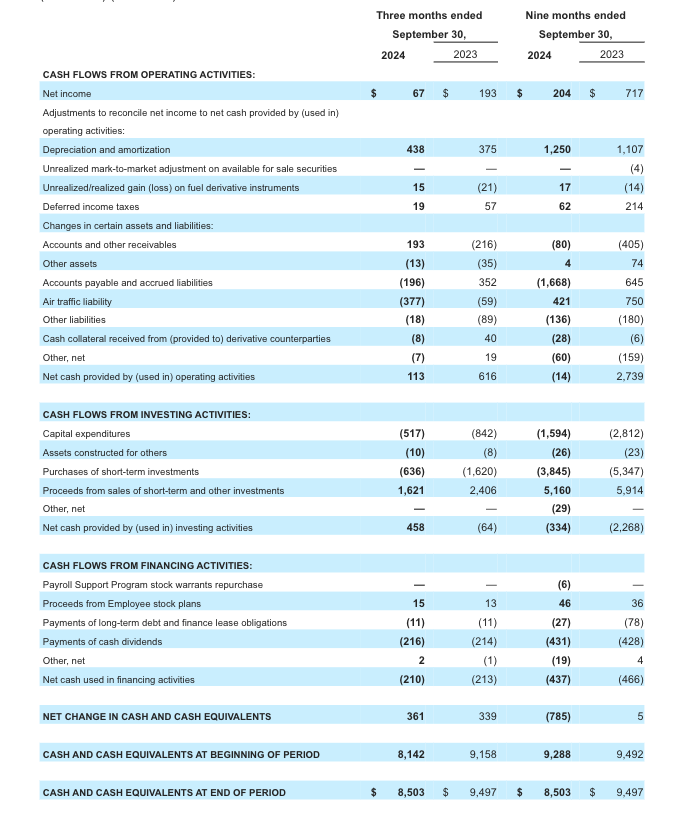
NOTE REGARDING USE OF NON-GAAP FINANCIAL MEASURES
The Company's unaudited Condensed Consolidated Financial Statements are prepared in accordance with accounting principles generally accepted in the United States (“GAAP”). These GAAP financial statements may include (i) unrealized noncash adjustments and reclassifications, which can be significant, as a result of accounting requirements and elections made under accounting pronouncements relating to derivative instruments and hedging and (ii) other charges and benefits the Company believes are unusual and/or infrequent in nature and thus may make comparisons to its prior or future performance difficult.
As a result, the Company also provides financial information in this release that was not prepared in accordance with GAAP and should not be considered as an alternative to the information prepared in accordance with GAAP. The Company provides supplemental non-GAAP financial information (also referred to as “excluding special items”), including results that it refers to as “economic,” which the Company's management utilizes to evaluate its ongoing financial performance and the Company believes provides additional insight to investors as supplemental information to its GAAP results. The non-GAAP measures provided that relate to the Company’s performance on an economic fuel cost basis include Operating expenses, non-GAAP excluding Fuel and oil expense; Operating expenses, non-GAAP excluding Fuel and oil expense and profitsharing; Operating income, non-GAAP; Other (gains) losses, net, non-GAAP; Income before income taxes, non-GAAP; Provision for income taxes, net, non-GAAP; Net income, non-GAAP; Net income per share, diluted, non-GAAP; and Operating expenses per ASM, non-GAAP, excluding Fuel and oil expense and profitsharing (cents). The Company's economic Fuel and oil expense results differ from GAAP results in that they only include the actual cash settlements from fuel hedge contracts – all reflected within Fuel and oil expense in the period of settlement. Thus, Fuel and oil expense on an economic basis has historically been utilized by the Company, as well as some of the other airlines that utilize fuel hedging, as it reflects the Company’s actual net cash outlays for fuel during the applicable period, inclusive of settled fuel derivative contracts. Any net premium costs paid related to option contracts that are designated as hedges are reflected as a component of Fuel and oil expense, for both GAAP and non-GAAP (including economic) purposes in the period of contract settlement. The Company believes these economic results provide further insight into the impact of the Company's fuel hedges on its operating performance and liquidity since they exclude the unrealized, noncash adjustments and reclassifications that are recorded in GAAP results in accordance with accounting guidance relating to derivative instruments, and they reflect all cash settlements related to fuel derivative contracts within Fuel and oil expense. This enables the Company's management, as well as investors and analysts, to consistently assess the Company's operating performance on a year-over-year or quarter-over-quarter basis after considering all efforts in place to manage fuel expense. However, because these measures are not determined in accordance with GAAP, such measures are susceptible to varying calculations, and not all companies calculate the measures in the same manner. As a result, the aforementioned measures, as presented, may not be directly comparable to similarly titled measures presented by other companies.
Further information on (i) the Company's fuel hedging program, (ii) the requirements of accounting for derivative instruments, and (iii) the causes of hedge ineffectiveness and/or mark-to-market gains or losses from derivative instruments is included in the Company’s Annual Report on Form 10-K for the fiscal year ended December 31, 2023.
The Company’s GAAP results in the applicable periods may include other charges or benefits that are also deemed “special items,” that the Company believes make its results difficult to compare to prior periods, anticipated future periods, or industry trends. Financial measures identified as non-GAAP (or as excluding special items) have been adjusted to exclude special items. For the periods presented, in addition to the items discussed above, special items include:
- Incremental expense associated with contract ratification bonuses for various workgroups related to additional compensation for services performed by Employees outside the applicable fiscal period;
- Charges associated with tentative litigation settlements regarding certain California state meal-and-rest-break regulations for flight attendants and an arbitration award in favor of the Company's Pilots relating to a collective-bargaining matter;
- Expenses associated with incremental professional advisory fees related to activist investor activities, which were not budgeted by the Company, are not associated with the ongoing operation of the airline, and are difficult to predict in future periods;
- Unrealized mark-to-market adjustment associated with certain available for sale securities; and
- A charge associated with a settlement reached with the Department of Transportation as a result of the Company's December 2022 operational disruption.
Because management believes special items can distort the trends associated with the Company’s ongoing performance as an airline, the Company believes that evaluation of its financial performance can be enhanced by a supplemental presentation of results that exclude the impact of special items in order to enhance consistency and comparativeness with results in prior periods that do not include such items and as a basis for evaluating operating results in future periods. The following measures are often provided, excluding special items, and utilized by the Company’s management, analysts, and investors to enhance comparability of year-over-year results, as well as to industry trends: Operating expenses, non-GAAP excluding Fuel and oil expense; Operating expenses, non-GAAP excluding Fuel and oil expense and profitsharing; Operating income, non-GAAP; Other (gains) losses, net, non-GAAP; Income before income taxes, non-GAAP; Provision for income taxes, net,
non-GAAP; Net income, non-GAAP; Net income per share, diluted, non-GAAP; and Operating expenses per ASM, non-GAAP, excluding Fuel and oil expense and profitsharing (cents).
The Company has also provided its calculation of return on invested capital, which is a measure of financial performance used by management to evaluate its investment returns on capital. Return on invested capital is not a substitute for financial results as reported in accordance with GAAP and should not be utilized in place of such GAAP results. Although return on invested capital is not a measure defined by GAAP, it is calculated by the Company, in part, using non-GAAP financial measures. Those non-GAAP financial measures are utilized for the same reasons as those noted above for Net income, non-GAAP and Operating income, non-GAAP. The comparable GAAP measures include charges or benefits that are deemed “special items” that the Company believes make its results difficult to compare to prior periods, anticipated future periods, or industry trends, and the Company’s profitability targets and estimates, both internally and externally, are based on non-GAAP results since “special items” cannot be reliably predicted or estimated. The Company believes non-GAAP return on invested capital is a meaningful measure because it quantifies the Company's effectiveness in generating returns relative to the capital it has invested in its business. Although return on invested capital is commonly used as a measure of capital efficiency, definitions of return on invested capital differ; therefore, the Company is providing an explanation of its calculation for non-GAAP return on invested capital in the accompanying reconciliation in order to allow investors to compare and contrast its calculation to the calculations provided by other companies.
The Company has also provided adjusted debt, invested capital, and adjusted debt to invested capital (leverage), which are non-GAAP measures of financial performance. Management believes these supplemental measures can provide a more accurate view of the Company's leverage and risk, since they consider the Company’s debt and debt-like obligation profile and capital. Leverage ratios are widely used by investors, analysts, and rating agencies in the valuation, comparison, rating, and investment recommendations of companies. Although adjusted debt, invested capital, and leverage ratios are commonly-used financial measures, definitions of each differ; therefore, the Company is providing an explanation of its calculations for non-GAAP adjusted debt and adjusted equity in the accompanying reconciliation below in order to allow investors to compare and contrast its calculations to the calculations provided by other companies. Invested capital is adjusted debt plus adjusted equity. Leverage is calculated as adjusted debt divided by invested capital.
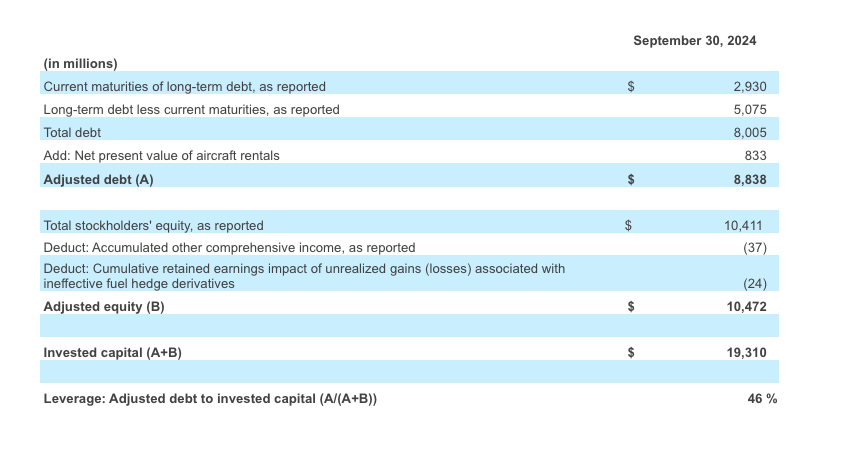
Investor Contact:
Southwest Airlines Investor Relations
214-792-4415
Media Contact:
Southwest Airlines Media Relations
214-792-4847
swamedia@wnco.com












